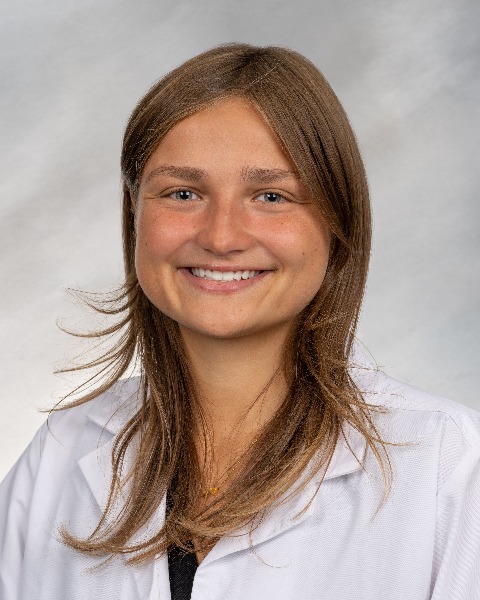Sunday Poster Session
Category: Esophagus
P0749 - Lichenoid Esophagitis Presentation in a Patient
Sunday, October 26, 2025
3:30 PM - 7:00 PM PDT
Location: Exhibit Hall

Alexa Maruszewski, BS (she/her/hers)
Wayne State University School of Medicine
Detroit, MI
Presenting Author(s)
Alexa Maruszewski, BS1, Anas Kutait, MD2, Syed-Mohammed Jafri, MD2
1Wayne State University School of Medicine, Detroit, MI; 2Henry Ford Health, Detroit, MI
Introduction: We present diagnosis and management of a patient presenting with dysphagia due to lichenoid esophagitis.
Case Description/
Methods: A 64-year-old white female presents with a ten-year history of recurrent esophageal stricture and dysphagia. The patient undergoes repeat esophagogastroduodenoscopy for esophageal dilation and triamcinolone injection. Given recurrent symptoms a biopsy is conducted. The pathology demonstrates severely active neutrophilic esophagitis with ulceration and parakeratosis. There is sloughing of the esophageal mucosa. The patient is advised to continue pantoprazole twice daily and sucralfate daily.
The patient continues to have recurrent dysphagia and food impaction over the next year. Repeat biopsies of the proximal and distal esophagus show squamous mucosa with mixed inflammatory infiltrates, involving the lamina propria distally, with lymphocytic predominance and multiple dyskeratotic cells. Due to the presence of dyskeratosis with possible lichen planus another biopsy with immunofluorescence is performed to confirm the diagnosis. The biopsy presents squamous mucosa with brisk chronic inflammation with a lichenoid inflammatory pattern, scattered Civatte bodies, and eosinophils. The presented inflammatory pattern and Civatte bodies indicate esophageal lichen planus.
The patient initiates swallowing fluticasone and is referred to dermatology. Overall the patient's symptoms improve over the next year, without the need for endoscopic dilation. The patient is advised to take pantoprazole with fluconazole twice daily, two fluticasone puffs twice daily, and to follow up with dermatology.
Discussion: Lichenoid esophagitis is a rare diagnosis that presents with dysphagia, esophageal strictures, and Civatte bodies on pathology. The pathophysiology and treatment options should be discussed with affected patients. Treatment options include endoscopic dilation and topical steroids.
Disclosures:
Alexa Maruszewski indicated no relevant financial relationships.
Anas Kutait indicated no relevant financial relationships.
Syed-Mohammed Jafri: Abbvie – Speakers Bureau. Gilead – Speakers Bureau. Intercept – Speakers Bureau. Ironwood – Speakers Bureau. Takeda – Speakers Bureau.
Alexa Maruszewski, BS1, Anas Kutait, MD2, Syed-Mohammed Jafri, MD2. P0749 - Lichenoid Esophagitis Presentation in a Patient, ACG 2025 Annual Scientific Meeting Abstracts. Phoenix, AZ: American College of Gastroenterology.
1Wayne State University School of Medicine, Detroit, MI; 2Henry Ford Health, Detroit, MI
Introduction: We present diagnosis and management of a patient presenting with dysphagia due to lichenoid esophagitis.
Case Description/
Methods: A 64-year-old white female presents with a ten-year history of recurrent esophageal stricture and dysphagia. The patient undergoes repeat esophagogastroduodenoscopy for esophageal dilation and triamcinolone injection. Given recurrent symptoms a biopsy is conducted. The pathology demonstrates severely active neutrophilic esophagitis with ulceration and parakeratosis. There is sloughing of the esophageal mucosa. The patient is advised to continue pantoprazole twice daily and sucralfate daily.
The patient continues to have recurrent dysphagia and food impaction over the next year. Repeat biopsies of the proximal and distal esophagus show squamous mucosa with mixed inflammatory infiltrates, involving the lamina propria distally, with lymphocytic predominance and multiple dyskeratotic cells. Due to the presence of dyskeratosis with possible lichen planus another biopsy with immunofluorescence is performed to confirm the diagnosis. The biopsy presents squamous mucosa with brisk chronic inflammation with a lichenoid inflammatory pattern, scattered Civatte bodies, and eosinophils. The presented inflammatory pattern and Civatte bodies indicate esophageal lichen planus.
The patient initiates swallowing fluticasone and is referred to dermatology. Overall the patient's symptoms improve over the next year, without the need for endoscopic dilation. The patient is advised to take pantoprazole with fluconazole twice daily, two fluticasone puffs twice daily, and to follow up with dermatology.
Discussion: Lichenoid esophagitis is a rare diagnosis that presents with dysphagia, esophageal strictures, and Civatte bodies on pathology. The pathophysiology and treatment options should be discussed with affected patients. Treatment options include endoscopic dilation and topical steroids.
Disclosures:
Alexa Maruszewski indicated no relevant financial relationships.
Anas Kutait indicated no relevant financial relationships.
Syed-Mohammed Jafri: Abbvie – Speakers Bureau. Gilead – Speakers Bureau. Intercept – Speakers Bureau. Ironwood – Speakers Bureau. Takeda – Speakers Bureau.
Alexa Maruszewski, BS1, Anas Kutait, MD2, Syed-Mohammed Jafri, MD2. P0749 - Lichenoid Esophagitis Presentation in a Patient, ACG 2025 Annual Scientific Meeting Abstracts. Phoenix, AZ: American College of Gastroenterology.
